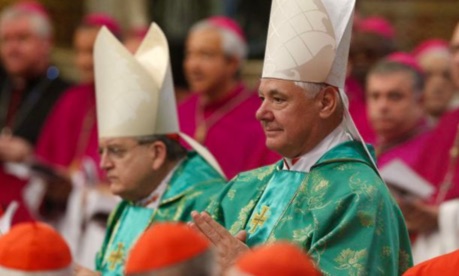Battle lines have been drawn for October’s highly anticipated Vatican summit on the Amazon region, where the proposal to give isolated communities access to the sacraments by ordaining married men has led to uproar — frustrating some of the meeting’s organizers for distracting from other pastoral concerns at stake in the region.
Father Michael Czerny, a Jesuit priest and longtime Vatican official who Pope Francis will make a cardinal a day before the synod opens, recently issued a plea for the Church to realize the urgency of greater attention to the Amazon region and not to be distracted by “contemporary misconceptions and pernicious practices” regarding it.
Czerny, who will serve as a special secretary to the Amazon synod, cautioned that “the social and the natural cannot — and the environmental and the pastoral must not — be separated,” — likely as an indirect response to retired German Cardinal Walter Brandmüller who said that the synod’s working document is “heretical” and should be rejected.
Brandmüller went on to ask: “What do ecology, economy, and politics have to do with the mandate and mission of the Church?”
“Dangerous compartmentalizations — intellectual and spiritual, economic and political — have put human life in jeopardy on Earth, the common home of humanity,” Czerny countered.
Such disagreements are not new, and for nearly four decades the region of the Amazon has been politically contentious and theologically divisive.
But in the lead-up to next month’s gathering, a network of far-right groups in Brazil headed by a controversial traditionalist with a long history of opposing Vatican II seems eager to capitalize on next month’s events to gain new momentum.
The Pan Amazon Synod could turn the Church into a structure-less and essentially ‘tribal’ organisation, in clear opposition to twenty centuries of Christianity.
One of the primary hubs of resistance to the October gathering is the Pan-Amazon Synod Watch, which was created by the Plinio Corrêa de Oliveira Institute (IPCO) and its “sister organizations,” the right-wing Societies for the Defense of Tradition, Family and Property (TFP).
Oliveira founded the TFP in 1960 as a bulwark against “communist” influences in society and the Church. Oliveira died in 1995, but he remains a powerful totem among traditionalist Catholics who favor an Ancien Régime view of the Church and a functioning hereditary nobility, primarily in Latin America and parts of Europe.
The organization, which claims to be the “largest coalition of associations in defense of Christian civilization,” has long sought to boost its visibility by conducting campaigns that are attractive to a wider number of Catholics, including the America Needs Fatima program in the United States.
The synod on the Amazon is giving it a new campaign with which it hopes to spread its message.
“Based on the solid, two thousand-year doctrine of the Catholic Church as well as serious scientific studies, this site aims to alert all those who are legitimately concerned about the news circulating about the Synod of Bishops for the Pan-Amazon region, to be held in October 2019 in Rome,” states the TFP-sponsored website.
In Rome on the eve of the synod, the organization will host a daylong workshop on “The Truth of the Amazon,” led by a number of traditionalist thinkers who are skeptical of the synod’s major areas of focus, including the Italian historian Roberto de Mattei, who penned a biography of Oliveria.
The Pan-Amazon Synod Watch website warns that the synod could turn the Church “into a structure-less and essentially ‘tribal’ organization, in clear opposition to twenty centuries of Christianity.” Continue reading
- Image: Crux
